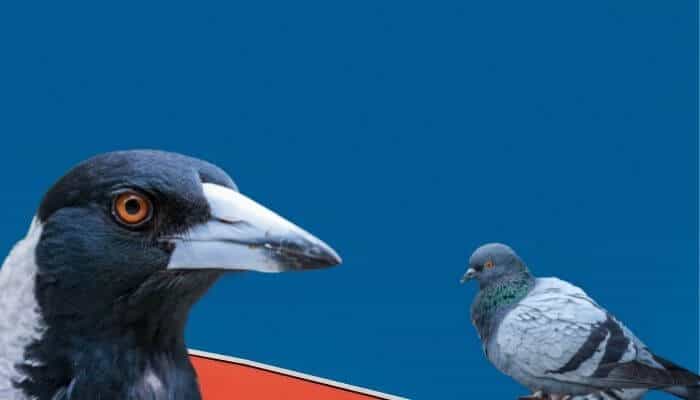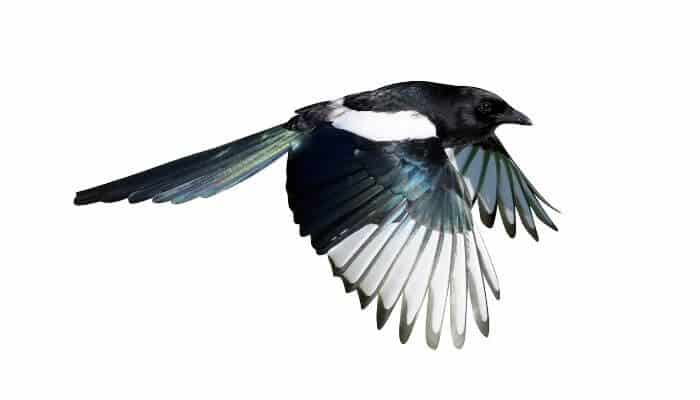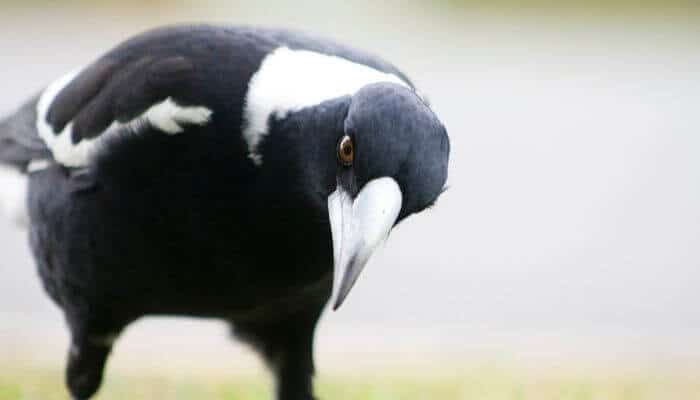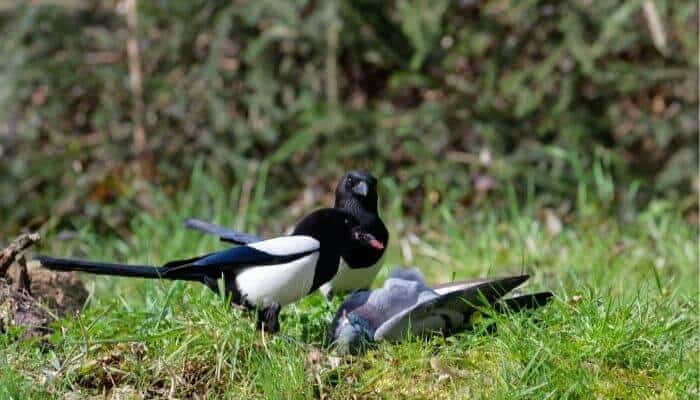The magpie is an omnivore and is not a friend to pigeons.
The magpie is not a bird of prey so the threat to pigeons is less than that of hawks, falcons and owls but the risk is ever-present.

Magpies will attack pigeons more to remove them from a food source than to enjoy as a meal but the latter is still a very real occurrence.
About Magpies
The magpie is a common sight in the UK.
They are so common that there is even a folk song/nursery rhyme about them – One for Sorrow.
It is one of the crow family, which is quite obvious if you look past the colors to see the shape of the bird.
Although the magpie may have the basic form of a crow, there is no other bird like it in the UK.

Characterized by its black and white plumage (which is actually a deep purplish and iridescent blue close up) and long-tail (which is dark green and glossy close up), the magpie is a noisy chatterbox.
It has the reputation of being a thief, attracted to shiny objects. In reality, there is no truth in this, and the story is an urban legend beginning back in 1815 and a French play called La Pie Voleuse.
The myth has been completely debunked by various studies.
So magpies may not be kleptomaniacs, but they have other less-endearing qualities.
Magpies are arrogant birds who are predators, scavengers and opportunists.
They are persistent and it is challenging for anyone to love these birds despite their attractive appearance.
What do Magpies Eat?
The bill of a magpie is designed for versatility which enables a flexible diet.
The bill is strong and thanks to a sharp cutting edge, it can cut flesh, dig up invertebrates and pick seeds and fruit.
There is little that the magpie won’t eat but their diet is partly seasonal.

In the summer, they feed on grassland invertebrates such as spiders, flies, caterpillars, beetles and worms.
In the winter, magpies mainly follow a plant-based diet, eating berries, grains and fruit along with any food they can scavenge from bird feeders, chicken coops/runs and pet food bowls.
Whatever the season however, magpies will eat meat and carrion.
They will catch birds and small mammals and are even known to eat young rabbits.
In the avian breeding season, magpies will raid nests including pigeon nests and will eat the eggs and young birds.
Magpies are also hoarders.
When they have an abundant food supply, they will bury it in the ground in a hole made with their beak, then make a lid with a leaf, grass or a stone.
Pigeons vs Magpies
It’s an unfair contest.
The magpie has tools in its arsenal the pigeon just can’t match.
Although lighter and slimmer than most of the UK’s pigeon breeds, the magpie is longer, taller and stronger.
But it is the beak where the pigeon is outbuilt.
The pigeon’s beak is designed for its mainly vegetarian diet (although it does eat small insects and other invertebrates) and can do no damage as a weapon.

The magpie’s beak is much longer and stronger.
There is no doubt that when a magpie chooses to attack a pigeon, the pigeon has little chance.
There is some hope for the pigeon though simply due to the magpie’s character.
As a vociferous bird, its constant chatter can alert pigeons to its proximity giving them a chance to fly away.
Magpies will attack anything.
There is anecdotal evidence of attacks on everything from hedgehogs to squirrels and even on larger birds of prey like falcons as well as gulls.
They are cunning in that with other birds, magpies will peck at their prey’s legs making it difficult for the prey to fly away.
It is quite usual that magpies will work together to attack a larger prey, pecking it to death.
Many times, magpies will attack simply to bait pigeons but mostly it is to drive them away from a food supply.
Magpies will always steal food rather than hunt it down for itself.
Unfortunately, pigeons exist in large numbers so generally, if your garden is visited by lots of pigeons, it is likely that magpies are not far behind.
How to Deter Magpies from Attacking Your Pigeons
As lovely as they are, pigeon owners would prefer magpies not to visit their gardens to avoid excess harassment of their pigeons. There are various ways to deter magpies including:
- Use bird feeders designed for smaller birds rather than tables
- Do not have a bird bath (unfortunately this will discourage other birds from visiting)
- Do not leave out any scraps of food and keep compost heaps covered
- Use deterrent bird tape or string up old CDs – magpies don’t like light reflection
Magpies are marvellous birds, but pigeon owners would rather admire them from afar!
